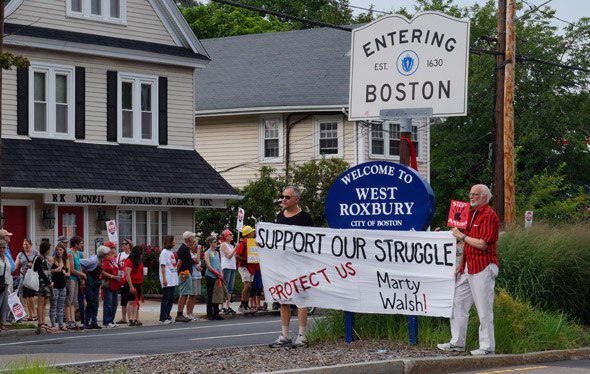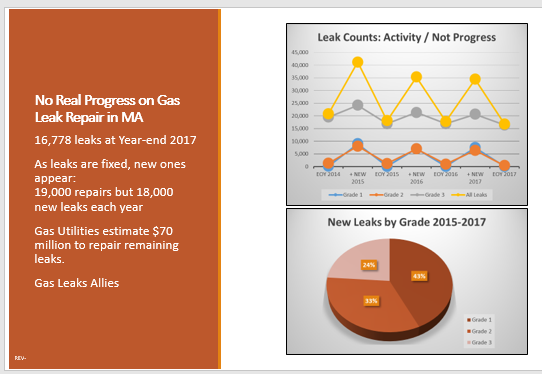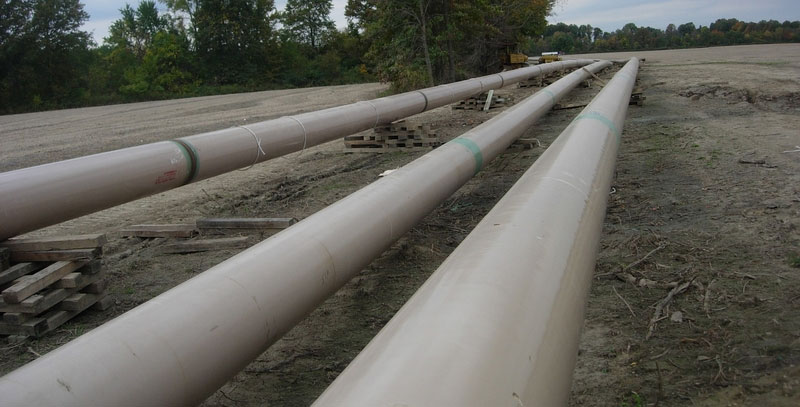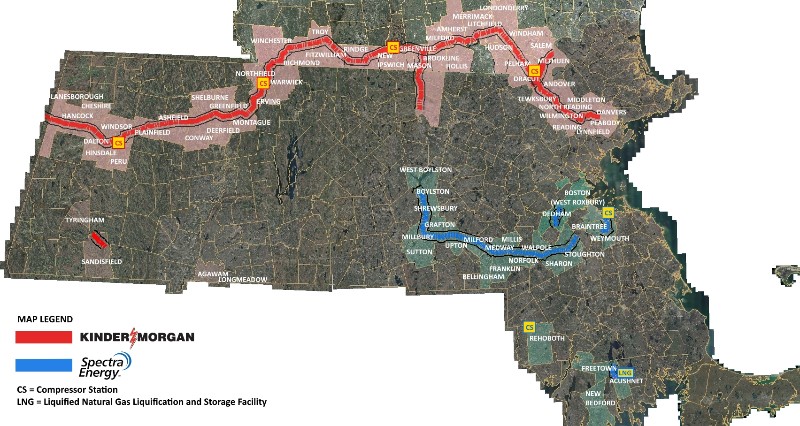The pipeline and natural gas industries are aiming to build new and larger gas infrastructure projects in Massachusetts.
We oppose these expansions for many reasons. Read below to learn more and get involved.
 Methane gas is driving up energy bills and represents a major financial, health, safety, and climate risk to the Commonwealth. “Natural” gas is a fossil fuel composed primarily of methane, drilled to the surface from deep underground by a process known as hydraulic fracturing or “fracking” in shale rock. More than half of our electricity is generated from gas-fired electricity plants, and many building and home heating systems rely on it currently as well. This does not have to be the case. Our own state's Clean Energy and Climate Plans (2025 and 2030, and 2050) show that we can protect Massachusetts electricity customers from price volatility, reduce risks of disaster, and reduce air and climate pollution by aggressively converting to electric-source heating systems powered by greater amounts of renewable energy. The statewide emissions limit for 2030 is 50% of 1990 levels and for 2050 is set at Net Zero. Ending our reliance on dirty and dangerous fossil fuels very soon is key to meet these targets for the good of our communities and our environment.
Methane gas is driving up energy bills and represents a major financial, health, safety, and climate risk to the Commonwealth. “Natural” gas is a fossil fuel composed primarily of methane, drilled to the surface from deep underground by a process known as hydraulic fracturing or “fracking” in shale rock. More than half of our electricity is generated from gas-fired electricity plants, and many building and home heating systems rely on it currently as well. This does not have to be the case. Our own state's Clean Energy and Climate Plans (2025 and 2030, and 2050) show that we can protect Massachusetts electricity customers from price volatility, reduce risks of disaster, and reduce air and climate pollution by aggressively converting to electric-source heating systems powered by greater amounts of renewable energy. The statewide emissions limit for 2030 is 50% of 1990 levels and for 2050 is set at Net Zero. Ending our reliance on dirty and dangerous fossil fuels very soon is key to meet these targets for the good of our communities and our environment.
Put Gas in the Past
Sierra Club MA is a part of the Mass Power Forward Coalition. Put Gas in the Past is Mass Power Forward’s campaign to halt new gas system expansions until there is a concrete plan for a just transition to a clean and green energy future.
We Don't Need More Gas Infrastructure
Despite cost-effective clean energy alternatives that can help Massachusetts meet its climate goals, gas utilities continue to plow ahead with projects to build new large gas pipelines (more than one mile in length and 100 psi in capacity). Since 2021, Eversource has sought to build 5.3 miles of redundant methane gas pipelines from Longmeadow to Springfield – costing gas customers $33 million in additional costs and a total price tag of $65 million. From 2021-2023, gas utilities collectively forecasted approximately 72,000 new customers and continue to project an unrealistic 2% annual growth rate (as of April 2024). These projections are then used to justify even larger interstate gas pipeline expansions like the proposed Project Maple.
Too often, new energy infrastructure is placed in overburdened, low-income communities of color. As long as Massachusetts continues to encourage the expansion of the gas system, a shrinking base of Massachusetts gas customers—and potentially taxpayers writ large—will be on the hook to pay for these reckless capital expenditures at a time when the market is shifting toward highly efficient heat pumps and networked geothermal. It is completely unacceptable for our government to allow pipeline expansion knowing it will likely generate these stranded costs.
The Baker administration's Commission on Clean Heat Report states “investments that would support new or increased natural gas infrastructure or capacity should instead be deployed to advance measures that help support the net zero future.” And yet, in two recent proposals in Longmeadow-Springfield and Douglas, Eversource never seriously considered non-pipe alternatives. In Springfield, which has some of the highest rates of asthma in Massachusetts, residents should be given opportunities to upgrade to cleaner, more efficient alternatives rather than locking in further fossil fuel use.
Now, the Healey administration's DPU has made it clear that we should only consider proposals seriously considering non-pipe alternatives. Still, it continues to be obligated to spend resources considering pipe proposals. Read more about the DPU’s docket on the Future of Gas (DPU 20-80) and Massachusetts definitively stating that gas heating is not in our long term future here.
New Gas Infrastructure Is Not a Good Investment
Under the Gas System Enhancement Plan (GSEP), created in 2014, gas utilities are on track to rack up more than $34 billion to replace aging methane pipes through 2039, charged to gas customers in the form of increasing fixed monthly charges.
Not only are Massachusetts gas customers facing higher bills today to cover the cost of this spending, but will see their monthly bills double in the next 10 years if state leaders fail to intervene. Beyond the cost of maintaining Massachusetts aging gas pipelines, the era of cheap natural gas in Massachusetts is in the past. Since 2016, the price of gas has increased 82% in Massachusetts.
There are more cost-effective approaches to mitigating risks from Massachusetts’s gas system, including repairing gas pipes instead of replacing them and strategically downsizing leaky parts of the gas system in favor of highly efficient electric alternatives.
Billions spent on new fossil fossil fuel infrastructure could be spent instead on the renewable energy future that we need to move toward expeditiously. An energy system based on renewable sources will serve us in many ways: It will help stave off the worse impacts of climate change; it will help our MA economy; it will improve the air we all breathe and water we all drink; and it will give us a future free of the price volatility of fossil fuels. Taking dollars away from renewables will lock us into exporting our energy dollars. We need to spend that money here, on energy efficiency, energy conservation, renewables, and fixing the old, leaking pipelines we already have.
Pipelines Are Dangerous
In addition to all the above, gas infrastructure is dangerous. They transport a gas that is highly flammable and subject to explosion. The tragic 2018 Merrimack Valley explosions demonstrated that all too well. An entirely avoidable over-pressurization event destroyed dozens of homes, left thousands of families without heat or power as winter approached, and caused the death of an 18-year old man.
 Despite this disaster in our own backyard, high-pressure pipelines are still being proposed in high-density residential areas, a dangerous mix. In December 2018 a new gas safety law was introduced to require “all natural gas work that might pose a material risk to the public be reviewed and approved by a certified professional engineer.”
Despite this disaster in our own backyard, high-pressure pipelines are still being proposed in high-density residential areas, a dangerous mix. In December 2018 a new gas safety law was introduced to require “all natural gas work that might pose a material risk to the public be reviewed and approved by a certified professional engineer.”
This is the time to move quickly toward a new, renewable energy future, not spend billions on the old way - the volatile, toxic, expensive, monopolistic, fossilized way.
Plugging Gas Leaks
Massachusetts has one of the nation’s oldest natural gas infrastructural systems, and it is showing its age. Old cast iron and steel pipes are especially prone to leaks. In December 2018, the Department of Public Utilities released their fourth annual report on gas leaks (they have only been required to do so since the passing of 2014 law). This DPU report provides data for the year 2017, and found:
-
48% of recorded leaks in 2017 were new leaks
-
78% of new leaks in 2017 were hazardous (Grade 1 or Grade 2)
-
16,778 leaks remained at the end of 2017
-
The cost to repair all remaining leaks is $70 million

Leaks Threaten Safety, Health, and the Environment
 When natural gas is burned, it produces carbon dioxide, but the gas itself is primarily methane which is the second-largest contributor to global warming after carbon dioxide. When gas leaks methane into the atmosphere, the climate impact is even worse because methane captures 84 times as much heat in the atmosphere as carbon dioxide over a 20-year period. Massachusetts is legally required to reduce climate pollutants by 80 percent by 2050. Leaking pipelines undermine our efforts to reach these goals.
When natural gas is burned, it produces carbon dioxide, but the gas itself is primarily methane which is the second-largest contributor to global warming after carbon dioxide. When gas leaks methane into the atmosphere, the climate impact is even worse because methane captures 84 times as much heat in the atmosphere as carbon dioxide over a 20-year period. Massachusetts is legally required to reduce climate pollutants by 80 percent by 2050. Leaking pipelines undermine our efforts to reach these goals.
-
According to a 2016 study by Boston University, a handful of super-emitters--about 7% of all leaks-- are responsible for half of the leaked gas. Repairing these huge leaks can sharply reduce the state’s methane emissions and save ratepayers real money.
-
Natural gas (all natural gas is now extracted through fracking) is harmful to vegetation, kills trees, and forms ozone which affects human health and aggravates allergies and asthma.
-
Replacing old pipe with new reduces operations and maintenance expenses. From a CLF report: "According to the filings of natural gas companies with replacement programs in place, for every mile of leak-prone pipe that they replace, they can reduce repair costs, defined as operations and maintenance expense, by up to $1,761 for bare steel and up to $2,188 for cast iron. Over the course of a year that can add up to $7.5 million in avoided operations and maintenance expenses if that pipeline is replaced with new pipe."
-
The reported locations of gas leaks have been mapped for many municipalities in Massachusetts by our friends at HEET. See your city or town's gas leak locations here.
Health Impacts of Gas
Burning methane gas in our homes is a major source of health-harming air pollution. Fossil fuel heating equipment emits nitrogen oxides, a common air pollutant that not only harms health directly, but can contribute to the formation of deadly fine particulate matter (PM2.5) and ozone pollution. In 2022, researchers at Harvard University’s School of Public Health found benzene, a cancer causing chemical, leaking from gas stoves in the Boston area even when the appliances were turned off.
According to a peer-reviewed study, gas stove use is responsible for 15.4% of childhood asthma cases in the Bay State, and children living in homes with gas cooking stoves have a 42% higher risk of current asthma. According to a Stanford study, gas stoves have been found to emit benzene, a carcinogen associated with leukemia, at levels higher than secondhand smoke. Nationally, communities of color are exposed to two times more PM2.5 pollution from gas appliances than white people.
Massachusetts’ Skilled Workforce is Critical to a Clean Energy Future
For generations, skilled workers have dedicated their careers to providing affordable, reliable heat to Massachusetts residents. As Massachusetts seeks to meet its climate goals, this skilled workforce will be critical to both safely decommissioning the gas system and upgrading residents to highly efficient clean equipment. In particular, as utilities invest in networked geothermal, which relies on much of the same engineering and maintenance principles as gas pipelines, Massachusetts can create a pipeline to family-sustaining clean energy careers. To ensure these are good jobs, we must allow workers to organize by requiring labor peace agreements for all supply chain work, applying prevailing wage laws for all workers in the energy transition, and require disclosure of hiring plans to ensure contracts are chosen based on who has the highest trained, diverse, and fairly-compensated workforce, not who can cut the most corners.
Across the U.S., labor leaders support policies to accelerate the adoption of networked geothermal,also known as thermal energy networks. Nationally, this includes SEIU, AFL-CIO, and the United Association.
Learn More and Get Involved
To learn more and get involved, contact Jess Nahigian.
Resources
July 2024 Beyond Methane Gas
July 2024 Gas Expansion Undermines MA Net Zero Emissions Goals
December 2023 In plain language: the “Beyond Gas” decision and what it means for climate justice in Mass
June 2023 Fossil-Fueled Rates: How Gas Costs are Causing New England’s Electricity Price Spikes, and How Electrification Will Help Protect Customers in the Future
February 2020 Energy Economics 101
July 2019 Equitable transition to renewable energy can create millions of jobs (Letters)
May 2018 Understanding ISO New England’s Operational Fuel Security Analysis (Turns out we don't need more pipelines)
January 2018 More pipelines aren’t the answer
December 2017 PIC Grants Permit to Back Bay Pipeline Extension and Letter to the Boston Sun Editor
June 2017 Physicians for Policy Action: Letter to Governor Charlie Baker
May 2017 Oilprice.com: "3 Reasons natural gas is heading a lot higher"
May 2017 Letter to Thomas Cushing, Permit Chief, Massachusetts Department of Environmental Protection, Southeast Regional Office
April 2017 Commonwealth Magazine op-ed: Kill the Access Northeast Pipeline
April 2017 Mass. Boards of Health contact information
April 2017 Mass. Conservation Commission contact information
February 2017 Synapse Report: New England's Shrinking Need for Natural Gas
February 2017 Pennsylvania Chapter Chair Berkshire Eagle op-ed
June 2016 Sierra Club MA FERC dkt CP16-9 Atlantic Bridge proj 06-01-2016
May 2016 Sierra Club MA FERC dkt PF16-1 Access Northeast proj 05-31-2016
April 2016 Mass. Sierra Club letter regarding Omnibus Energy Bill, 4-22-16
March 2016 Massachusetts Sierra Club Testimony, DPU Hearing, National Grid, 3-10-16
February 2016 Massachusetts Sierra Club Testimony, DPU Hearing, Eversource, 2-25-16
Proposed fracked gas pipelines--slide from ISO-NE
April 2016 Dear Colleague Letter from Reps. Kulik & Jones opposing new pipelines
Health Impacts of Fracked Gas Pipelinesby Health Care Without Harm
September 2015 Letter from 5 State Reps to FERC
September 9, 2015 USA Today "Scientists: Replacing old gas pipes reduces leaks"
January 22, 2015 Boston Globe “Leaks in Boston area gas pipes exceed estimates”
December 2014 "Methane emissions from natural gas infrastructure and use in the urban region of Boston, Massachusetts"
August 2013 America Pays for Gas Leaks (Sen. Ed Markey)
